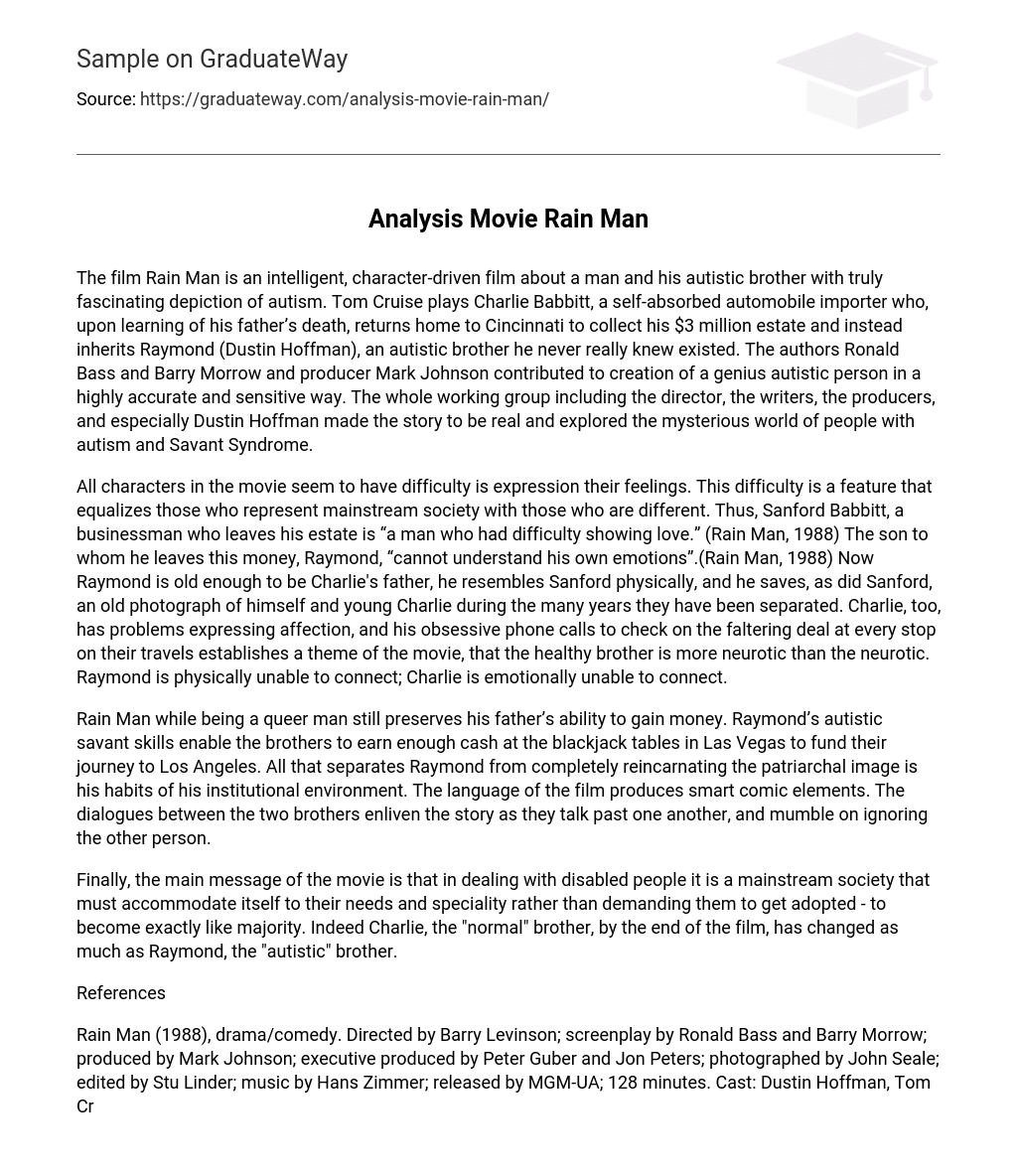The film Rain Man is an intelligent, character-driven film about a man and his autistic brother with truly fascinating depiction of autism. Tom Cruise plays Charlie Babbitt, a self-absorbed automobile importer who, upon learning of his father’s death, returns home to Cincinnati to collect his $3 million estate and instead inherits Raymond (Dustin Hoffman), an autistic brother he never really knew existed. The authors Ronald Bass and Barry Morrow and producer Mark Johnson contributed to creation of a genius autistic person in a highly accurate and sensitive way. The whole working group including the director, the writers, the producers, and especially Dustin Hoffman made the story to be real and explored the mysterious world of people with autism and Savant Syndrome.
All characters in the movie seem to have difficulty is expression their feelings. This difficulty is a feature that equalizes those who represent mainstream society with those who are different. Thus, Sanford Babbitt, a businessman who leaves his estate is “a man who had difficulty showing love.” (Rain Man, 1988) The son to whom he leaves this money, Raymond, “cannot understand his own emotions”.(Rain Man, 1988) Now Raymond is old enough to be Charlie’s father, he resembles Sanford physically, and he saves, as did Sanford, an old photograph of himself and young Charlie during the many years they have been separated. Charlie, too, has problems expressing affection, and his obsessive phone calls to check on the faltering deal at every stop on their travels establishes a theme of the movie, that the healthy brother is more neurotic than the neurotic. Raymond is physically unable to connect; Charlie is emotionally unable to connect.
Rain Man while being a queer man still preserves his father’s ability to gain money. Raymond’s autistic savant skills enable the brothers to earn enough cash at the blackjack tables in Las Vegas to fund their journey to Los Angeles. All that separates Raymond from completely reincarnating the patriarchal image is his habits of his institutional environment. The language of the film produces smart comic elements. The dialogues between the two brothers enliven the story as they talk past one another, and mumble on ignoring the other person.
Finally, the main message of the movie is that in dealing with disabled people it is a mainstream society that must accommodate itself to their needs and speciality rather than demanding them to get adopted – to become exactly like majority. Indeed Charlie, the “normal” brother, by the end of the film, has changed as much as Raymond, the “autistic” brother.
References
Rain Man (1988), drama/comedy. Directed by Barry Levinson; screenplay by Ronald Bass and Barry Morrow; produced by Mark Johnson; executive produced by Peter Guber and Jon Peters; photographed by John Seale; edited by Stu Linder; music by Hans Zimmer; released by MGM-UA; 128 minutes. Cast: Dustin Hoffman, Tom Cruise, Valeria Golino, Gerald Molen, Barry Levinson, Bonnie Hunt.
Treffert, Darold (2005) Rain Man, The Movie / Rain Man, Real Life Wisconsin Medical Society. Retrieved April 03, 2006 from http://www.wisconsinmedicalsociety.org/savant/rainman.cfm





